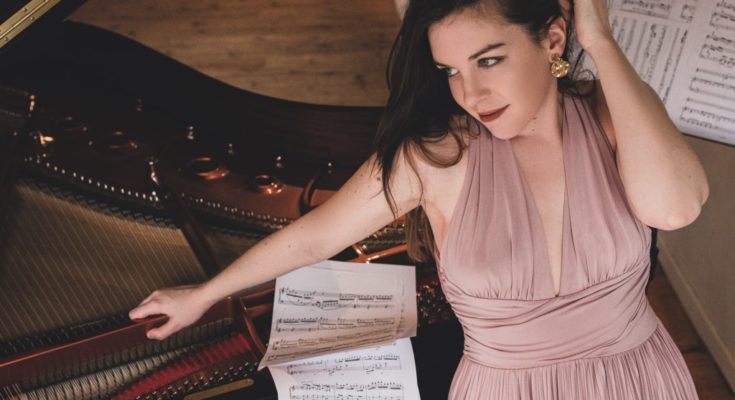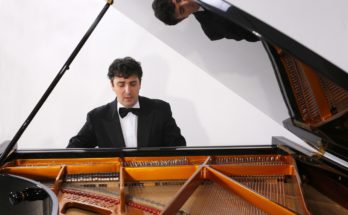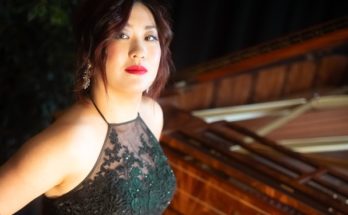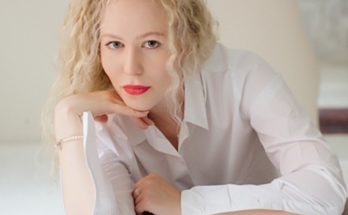This time PianoMe caught up with Gema to talk about what it means to be an orchestra musician and also about her experience of music teaching. We also spoke about her current initiatives and upcoming projects and she told us why she likes PianoMe’s idea.
PianoMe (PM): Dear Gema, thank you very much for your time! It is a great pleasure for us that you are ready for an interview with PianoMe!
Gema Arias (GA): Thank you so much for having me! I’m absolutely delighted to be here.
PM: That’s great, thank you! First of all, we would like to briefly introduce you to our readers, even though many of them probably already know who you are. Your collaborations in chamber music and orchestral ensembles has led you to investigate and to rediscover long forgotten musical pieces that are still unknown to the public. Since 2014 you have been a member of the Galician Chamber Music Orchestra (OCGa), where you have participated in the development of the project “Una noche española“, that exports the Spanish repertory to Europe. You have already performed in many different countries and participated in many festivals and international concert series, such as the Yan International Festival in Belgium, Festival Groba, Festival Melide Clásica, Les Ballades and Les Nocturnes from the Royal Conservatory of Brussels, among others. All this actually makes you the ideal user and testimonial for PianoMe!
GA: Yes! It’s true that when you are actually travelling so much, it is always handy to rely on a service such as the one PianoMe offers, otherwise, finding a piano room to practice can give you a bit of a headache.
PM: That makes us really happy to hear! Can you please tell us first how you got started playing the piano?
GA: Since my earliest memories, I have always loved music very much. My grandfather was a harmonica player, he never practiced an instrument in any professional way, but he is the one that introduced me into music when I was about 2 years old. At 3, he enrolled me at a music school, and in the room next to my class there was an upright piano. I’ve been told that I always admired this instrument. When I was seated on the chair in the corridor waiting for my music class, I always observed the students practicing a few notes before their class and I believe everything started there! At 5, I was already asking my parents non-stop to take piano lessons, and as you can see, not much has changed ever since.
PM: As an orchestra musician, you have performed in both chamber and orchestral ensembles. Can you please describe these experiences and the performance insights you gained?
GA: It is a very rewarding experience, and I consider myself very lucky to have had the chance to perform in chamber orchestras especially. First, because as you know, pianists are very well-known to be lonely people, we spend much time studying alone, and most of the time, we are just playing solo. Second, because you get to understand how music works on a deeper level when you practice with an ensemble. You learn how to adapt to different personal and musical situations and perceptions, and you realize that you need to put your ego aside and find compromises to make it really work.
PM: Very interesting! From your years of teaching piano, what is the main difficulty students have while learning the piano? How do you help them to overcome it?
GA: I believe that the hardest thing to achieve – no matter the instrument- it is to develop body awareness when learning the piano. Students, when they come to class, believe that an instrument is played only with the hands and fingers, and there are certainly more elements in the recipe that have to be taken into consideration: the wrist, forearms, elbows… even sitting properly! Without it, there is really not much that you can do to improve. Many students come to me with complex pieces and forearm and wrist pain, and this is the consequence of not being properly trained before.
What I always try to do is to analyze what is happening and try to guide them to be aware of the missing elements on their technique, so we can develop a good base to build a coherent body control that allows them to grow musically.
PM: As an experienced piano teacher, what would you consider the three most important traits of a good piano teacher?
GA: A good piano teacher should be a great listener, not only musically but personally. You really have to develop a deep understanding of your student goals and possibilities, so you don’t end up pushing a student too far over their boundaries. I would also search for somebody that has a big sense of empathy, which I believe we lack somehow nowadays, and most importantly, a good teacher should keep availabilities to prepare and plan the lessons. For me, it is really a must to be able to perform the compromising passages of a piece that demand a bigger understanding to the student.
PM: You founded your own online music school Pianoma. In what ways is your school different from other music schools?
GA: I believe that our job is focused more on the student than in teaching. Most professionals develop a method and a curriculum of pieces that they repeat student after student. We do not set the attention on this, but on the students’ profiles that we have in front of us: their goals, their musical tastes, their abilities and lacks, their personality. I believe the musical education needs to change its parameters and really manage to cope that we are all different. We should really stop to use the same elements and materials to teach every single student that passes through our studio, and include a bit of research and discovery in our work calendar. This is what we are actually trying to pursue in Pianoma, and hopefully succeeding on it.
PM: Interesting! When teaching online, how do you keep students engaged?
GA: It is actually very easy to keep a student engaged if he or she loves what they’re doing. Although, especially for kids, it is very important to set a good variety of activities in a lesson, so they don’t get distracted and actively participate in the challenges that we set. I believe that the hardest thing to achieve with a young student is to keep their attention when they need to make many repetitions to try to play a passage without learned mistakes. And what better way than to laugh and play some fun games with it! They love this, and we, teachers, get what we wanted (winking).
PM: I see. Actually, a very interesting idea. By the way, as a musician yourself, you know that the journey is never sweet and easy. What advice would you give to someone hoping to build a career as a musician?
GA: To find something – a musical piece, a teacher, a composer- to find their way back when things get hard. It is easy to drop, so easy that you can make that decision in a second. The hardest thing is to keep your love for music when you find many, countless stones in the way.
PM: Thank you. Let us speak about your other activities. I know that you are still combining your pedagogue and concert activities. You also perform didactic concerts with dance and theatre with the duo Indigo. Can you please tell us more about these activities?
GA: I really love to show families that going to a classical music concert can be fun and a great learning experience. With didactic concerts, classical pianists can get out of their performing suits and be more approachable to the public. It gives us the chance to really know who is actively listening to us, and to share some of our knowledge with the most demanding audience: the kids!
Most of the parents that came to the concerts that I performed next to my colleague, also pianist, Vincent Tohier, told me that they have never dared to take their children to concerts because their kids would lose attention easily. I believe these kinds of initiatives are sadly not promoted enough.
PM: Very interesting! I’m really sorry, but I have to ask (laughing). What is your opinion on sharing rehearsal spaces by hosting a studio on hourly basis?
GA: It is something that should have existed waaay before! (laughs)
PM: Thank you for the praise! It shows us that we are on the right track. Would you recommend PianoMe to a friend?
GA: I will answer this with a question, as us, Galician people, usually do: Why wouldn’t I?
PM: Finally, what are your aims for the future? Would you like to share any announcement with our readers?
GA: My main aim is to still be able to enjoy my job as a musician as I do today, and avoid burnout as much as possible! (laughs) That’s why I am researching into composing my own music. Most surely you will be able to hear it online by the end of this year.
PM: Dear Gema, we thank you for the interview and wish you all the best! See you again soon in the rehearsal rooms or concert halls of PianoMe.
GA: Sure, all my wishes to your wonderful project. See you very soon!
Copyright pictures:
Copyright: Anna Gauri / Copyright: Fundación Groba




